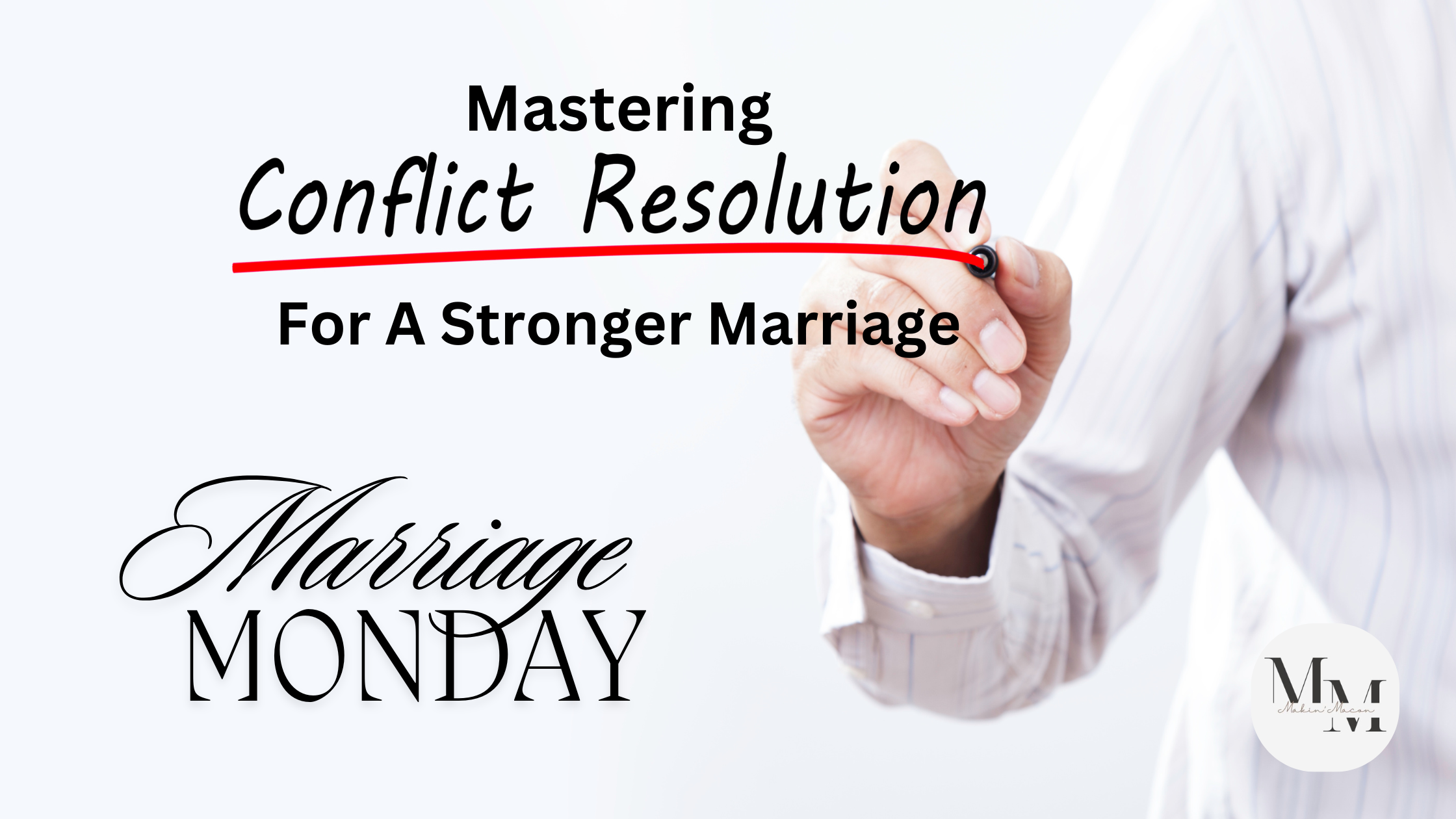Marriage Monday: Mastering Conflict Resolution for a Stronger Marriage

Welcome back to our Marriage Monday series! Last week, we talked about the importance of effective communication in marriage. Today, we’re diving into an equally critical topic: conflict resolution. Every couple experiences disagreements, but how you handle these conflicts can make or break your relationship. So, let’s explore some practical tips to help you and your spouse navigate conflicts constructively.
Tip #1: Acknowledge the Inevitable
Max Lucado, in his book When God Whispers Your Name, stated, “Conflict is inevitable, but combat is optional.” The first thing you need to realize is that there will always be some type of conflict in your marriage. It is a natural part of any relationship. However, you have the option of deciding whether to step into combat mode or not. Instead of avoiding disagreements, focus on handling them in a healthy, constructive manner.
I, for one, have to keep myself in check when it comes to conflict. My husband likes to “poke the bear” when I am upset, and if I am not careful, I will fly off the handle when he does. We have both had to learn how each other deals with conflict. Remember, it’s not the presence of conflict that defines a strong marriage, but how you deal with it. When you accept that conflicts are inevitable, you can approach them with a more open and positive mindset.
Tip #2: Stay Calm and Listen Actively
Okay, so I just pointed out that my husband likes to “poke the bear.” There are times I wonder if he does it intentionally. However, he has shared with me that sometimes he doesn’t realize things are as serious as they are. He always tries to find humor in situations, but he realizes there are moments to proceed with caution. In most of those times, I have warned the family ahead of time that momma isn’t in the mood.
When tempers flare, it is easy to interrupt and escalate the situation. We start pointing out each other’s faults and failures. We play the “blame game.” Yet, the first step to resolving conflict is to stay calm. Simply take a deep breath and practice active listening. This means that you REALLY listen to your spouse’s perspective without interruption or thinking about how you will respond when they finish.
A great way to practice active listening is to repeat back to your spouse what you heard them say. For instance, my husband and I have an ongoing joke about our “one car key fob.” We used this situation for one of my class projects. He stated that when I don’t put the key back on the rack, it frustrates him. I looked him in the eye and told him that what I heard was that he felt frustrated by my lack of attention to what was important to him.
It sounds super simple, but when you take the time to let them know you hear what they are saying, it shows your spouse that you are engaged, and it helps to avoid any misunderstandings.
Tip #3: Focus on the Issue, Not the Person
First and foremost, you need to remember that you are a team. When you married, you changed “me” to “we.” You must learn to work together to solve the problem. One great way to do this is to list the ways that each of you contributes to the problem.
For instance, our key fob conflict resulted in the following from both of us:
- My husband: “I fuss” and “I nag and point out the obvious.”
- Me: “I leave them in my purse.” “I have my hands full,” and “I point out that he doesn’t always do it.”
Yes, we had a great laugh over this, but it made us both realize that neither of us was solely to blame. We were both at fault in the situation. We both needed to mind our tongues. Personal attacks and blame can escalate conflicts and damage your relationship. So if you feel things starting to get heated, then you definitely need to read the next tip.
Tip #4: Take a Timeout if Needed
We had a marriage seminar at our church one year, and the couple that taught it had been married for 50 years. What an accomplishment! They were still so in love with each other. You could tell just by the way they spoke and acted with one another. When they spoke on conflict, they stated that when things start to get too heated, it is best for one of you to call a timeout. This way, you do not say something you will regret in the heat of the moment.
I, for one, do not like to have to say, “I’m sorry.” Taking a timeout is one of the best ways for me to sleep better at night. This gives me a chance to cool down and come back as a rational adult when we meet again. However, remember, if you call a timeout, you MUST set a time to come back and reconvene. Take a 15- or 30-minute break. Take 1 hour or even 24 hours. You choose what works best for both of you, but make sure that you meet back up to resolve the issue.
Tip #5: Compromise and Find Common Ground
As already mentioned, you are both in this together. There comes a time when you may have to compromise. You need to work together to find a middle ground where you both feel satisfied. There may be some give-and-take involved, but it is essential for maintaining a balanced and healthy marriage.
A great way to do this is to brainstorm some ideas. Each of you lists five possible solutions to the problem. Remember that you cannot judge or criticize any of the suggestions at this moment. Just write down the first things you can think of.
Next, discuss and evaluate each of the solutions, and then finally agree upon one solution to try. Once you’ve made your decision together, figure out how each of you will work towards the solution. Set a date to meet back up and discuss your progress.
I would love to go into depth and tell you our solutions for the “one key fob,” but it would take too much time. So, I have created a quick little short for you to view that will maybe bring a little laughter into your life. You can check it out on YouTube at Makin’ Macon!
Tip #6: Seek Professional Help if Needed
Listen, I have said it before in my previous post: I am not an expert on marriage advice. I am sharing what has worked to keep us married these past 25 years. With that being said, I know our “one key fob” situation is very minute in comparison to some issues. There are some situations where even taking these steps to resolve conflict will not work. In those situations, do not hesitate to seek professional help!
Your marriage matters! Do whatever it takes to keep it going and alive. Don’t let it die. There is no shame in asking for help; it shows your commitment to strengthening your marriage. Do your research and find a licensed marriage and family therapist (LMFT) in your area, or consider online counseling services if that is more convenient.
Conflict resolution is a vital skill in any marriage. By staying calm, listening actively, using “I” statements, focusing on issues, taking timeouts, compromising, and seeking professional help when needed, you can turn conflicts into opportunities for growth and deeper connection. Try incorporating these tips into your relationship and see how they can transform your interactions.
I would love to hear what strategies you use to resolve conflicts in your marriage. Share your tips in the comments below! Don’t forget to subscribe to my blog for more Marriage Monday content and check out my upcoming YouTube video for more insights on this topic.
Remember, I’m always praying for you, even if I don’t know who you are!
About Me:
Latest Post!
- Easy February Essential Oil Blend for Calm and Comfort
- Fresh Milled Flour Waffles for Beginners (Kid Approved!)
- Readiness That Builds Strength: Standing Firm When Faith Is Tested
- Fresh Milled Flour for Beginners: A Simple, Year-Long Family Journey
- When Fear Redirects our Focus: A Reflection from Haggai






